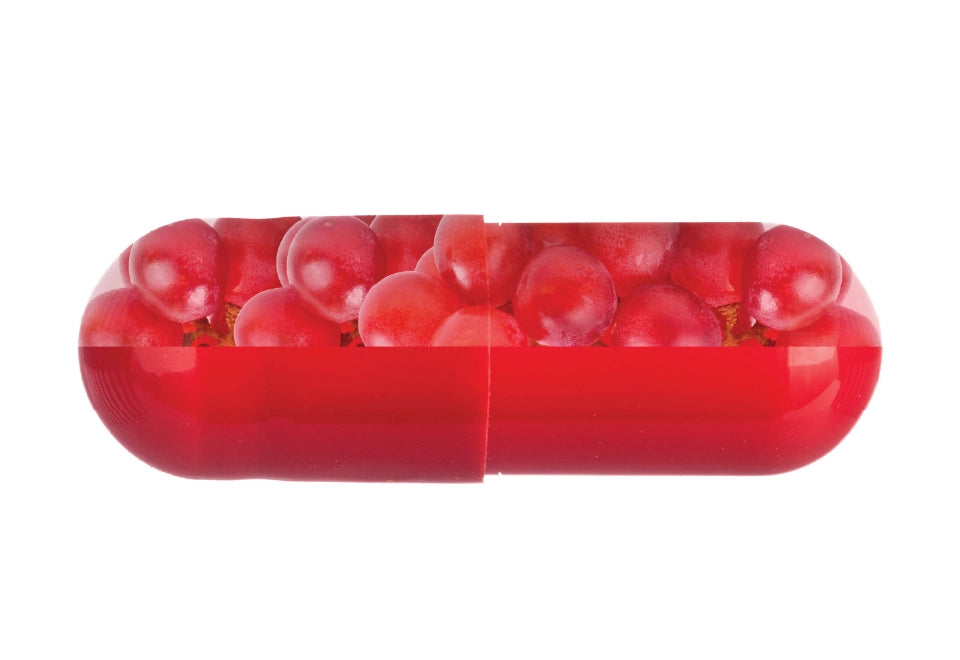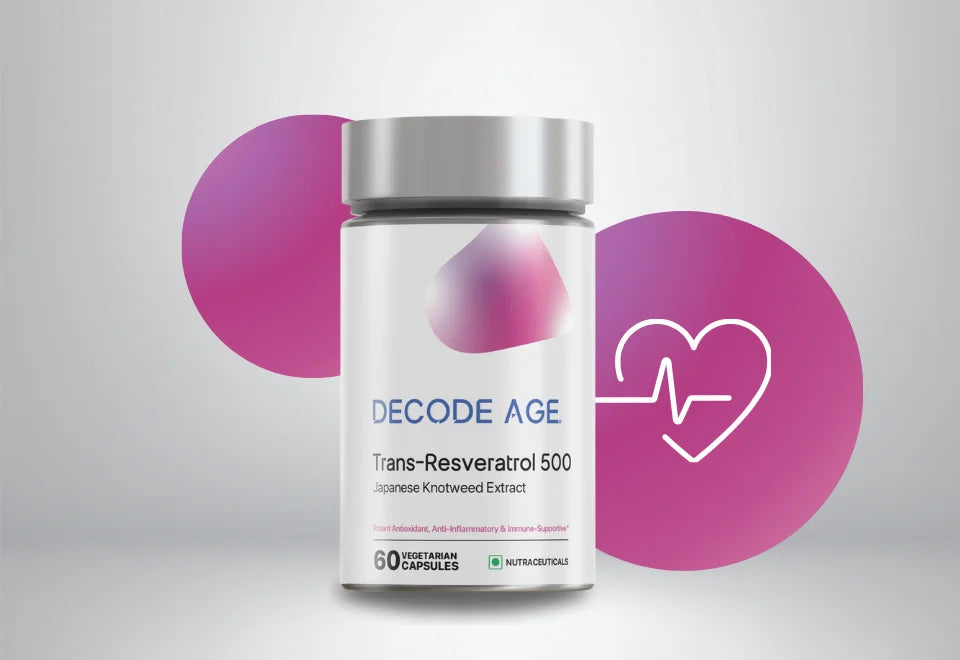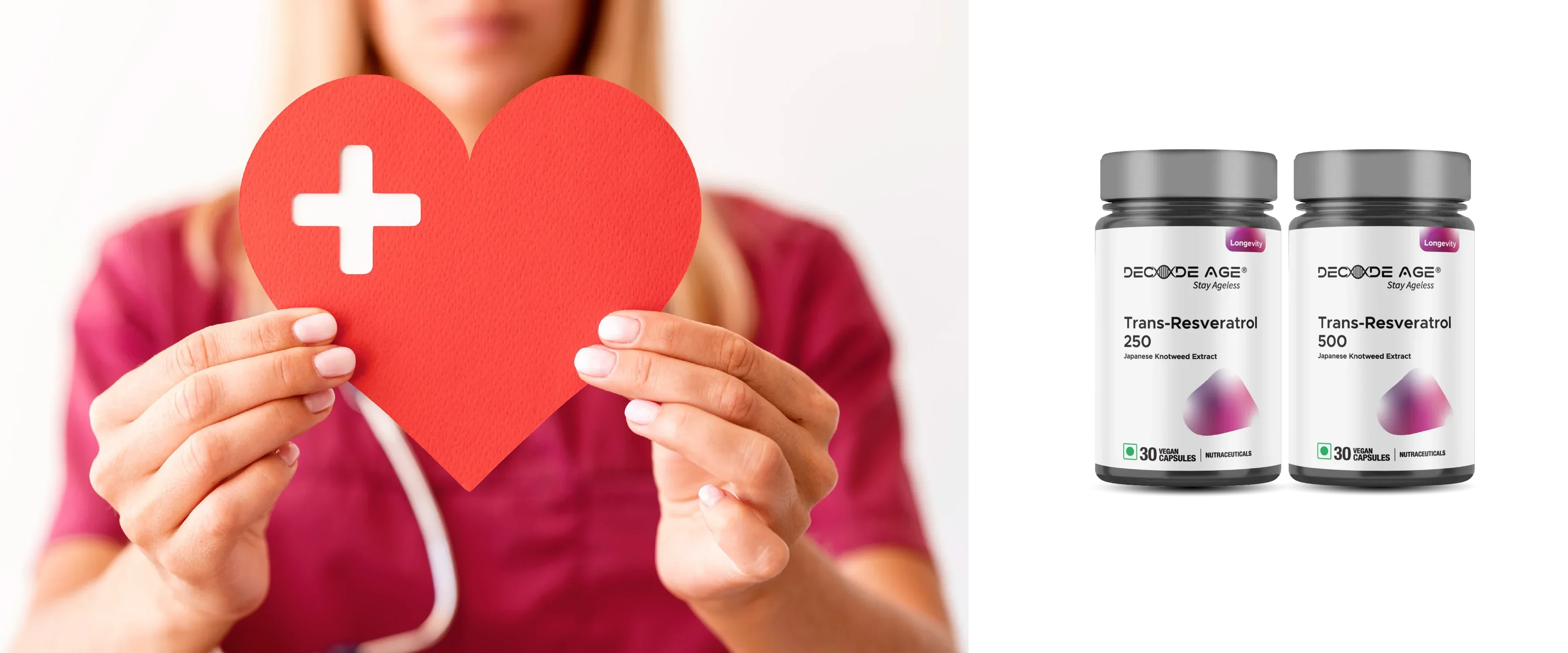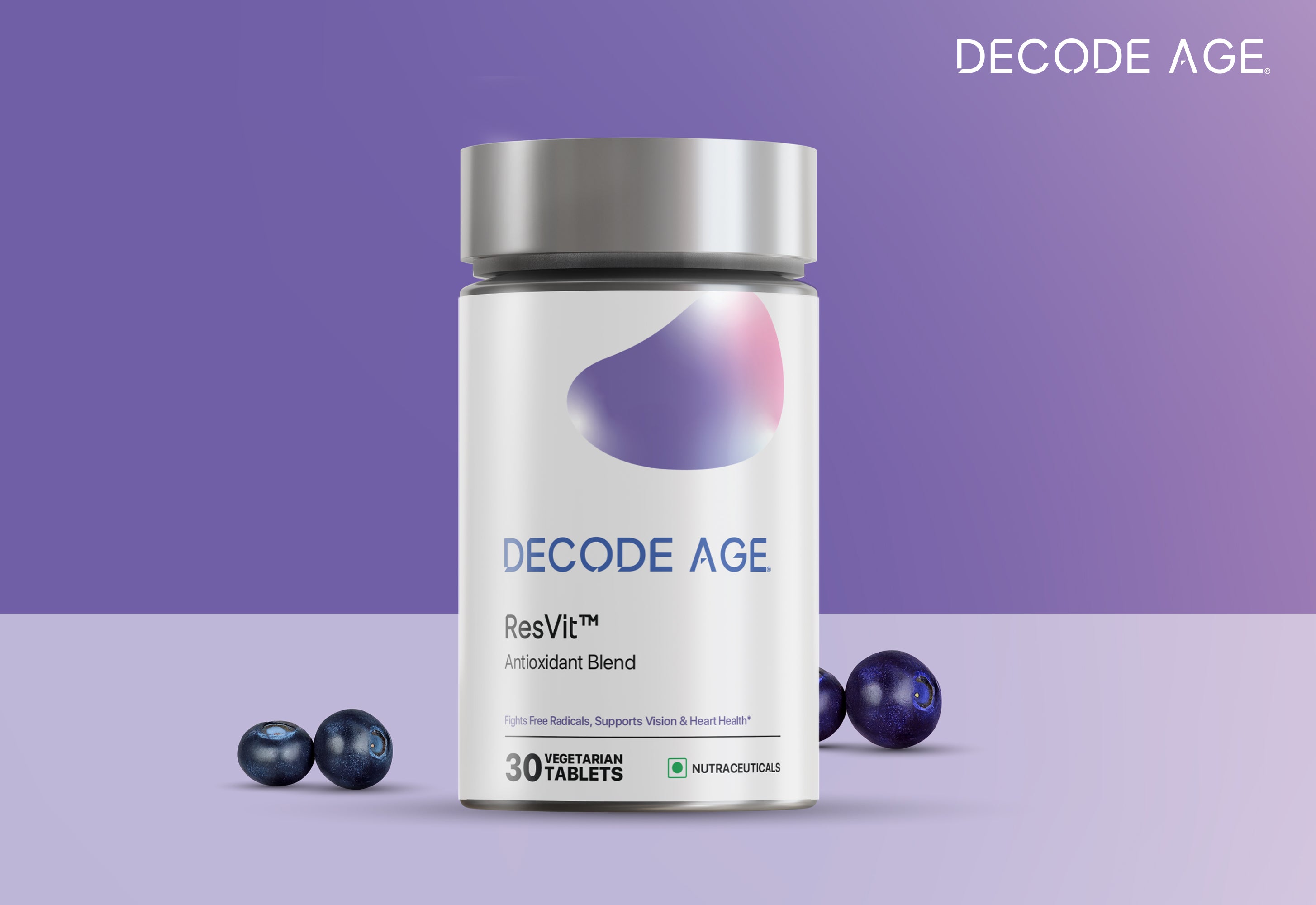Trans-resveratrol, a compound derived from plants, has gathered significant interest due to its potential health advantages. Belonging to the group of phytoalexins, which plants produce as a defence against diseases and environmental stressors, it has shown promise in improving various health concerns. In this blog we will understand how to take resveratrol and its recommended dosage.
Dosage and Administration
The trans-resveratrol recommended dosage can vary depending on the specific condition being addressed. It's essential to follow the dosage instructions provided on the product packaging or consult a healthcare professional before taking trans-resveratrol. While resveratrol generally has low toxicity and is well tolerated up to 5 grams per day, exceeding this amount may lead to gastrointestinal discomfort. To avoid potential side effects, it's best to stick to the recommended dosage.
Resveratrol dosage per day
Adults are advised to consume between 250mg to 1500mg of trans-resveratrol daily. Beginning with a lower dose and observing your body's response before making adjustments is recommended. It's important to note that the appropriate dosage may vary depending on the specific brand and type of trans-resveratrol supplement being used.
How to take Resveratrol: Timing and pairing
- When Trans-Resveratrol is taken with NMN: For optimal outcomes, it's advised to consume trans-resveratrol in the morning when paired with nicotinamide mononucleotide (NMN). This blend has demonstrated positive impacts on ageing and associated ailments.
- If Trans-Resveratrol is taken Alone: If you're consuming trans-resveratrol without NMN, it's advisable to take it in the evening post-dinner. This approach may help minimize potential side effects and enable the compound to function effectively overnight.
What are the possible side effects of Resveratrol?
Like any medication or supplement, it's crucial to be aware of potential side effects. Fortunately, there have been no reported adverse effects of resveratrol in humans, as evidenced by a small 2011 clinical trial administering 150 mg daily to obese patients without any negative reactions. However, it's still essential to adhere to recommended dosages and consult your doctor if you encounter unexpected side effects. Since resveratrol is relatively new, unknown long-term side effects may exist, emphasizing the importance of using it as directed and closely monitoring your health.
Contraindications and Interactions
Although trans-resveratrol is typically safe for most individuals, there are specific groups who should refrain from its consumption. These include children in their growth phase, females experiencing menstruation, and individuals diagnosed with anaemia. This caution stems from resveratrol's ability to bind with essential minerals like copper and iron, vital for these demographic groups. Additionally, trans-resveratrol might interact with certain medications, such as carbamazepine, and other substances metabolized by the CYP3A4 enzyme. Hence, it's crucial to seek guidance from a healthcare provider before commencing trans-resveratrol supplementation, especially if currently using any medications.
Clinical Evidence and Therapeutic Potential
Clinical trials have explored resveratrol's effects on various diseases:
- Cancer: The effectiveness of resveratrol in treating cancer is uncertain and varies depending on the type of cancer. While it has demonstrated potential in delaying the recurrence of certain cancers, its efficacy remains inconclusive across different studies. For example, its effects on prostate cancer are unclear, with some research suggesting potential benefits while others show no significant impact.
- Neurological Disorders: Resveratrol displays potential in addressing Alzheimer's disease and stroke, with clinical studies suggesting its safety and effectiveness in altering disease indicators.
- Cardiovascular Diseases: In certain clinical trials, it has shown cardioprotective effects by enhancing endothelial function and lowering indicators of atherosclerosis and inflammation.
- Diabetes: Resveratrol could enhance glycemic control and insulin sensitivity, although findings vary, indicating a requirement for further research.
- Nonalcoholic fatty liver disease (NAFLD): The effectiveness of using it as a supplement alongside lifestyle changes in treating NAFLD is uncertain, as some studies demonstrate positive outcomes while others do not provide conclusive evidence.
- Obesity: Trials have yielded varied outcomes, indicating that the effectiveness of the treatment may be influenced by the severity of conditions associated with obesity.
When contemplating the utilization of trans-resveratrol supplements, such as those provided by Decode Age, and NMN (Nicotinamide Mononucleotide), there are particular recommendations regarding who should refrain from using these supplements and the best times for their intake.
Who Should Avoid Resveratrol?
- Pregnant and Breastfeeding Women: Pregnant or nursing women are advised against taking resveratrol supplements.
- Individuals with Bleeding Disorders: Individuals with bleeding disorders should be careful or refrain from using resveratrol because of possible interactions.
- People Taking Certain Medications: Individuals taking medications for high blood pressure, anti-coagulants, or anti-platelets should exercise caution when considering Resveratrol supplements. Resveratrol's ability to lower blood pressure and its anti-coagulant properties can interact with these medications. Additionally, it may impact the effectiveness of liver medications.
- Individuals with Hormone-Sensitive Conditions: It is advisable to refrain from taking Resveratrol for two weeks before and after surgery because of its blood-thinning properties, which may heighten the risk of bleeding.
- Pre- and Post-Surgery Patients: It is recommended to avoid consuming Resveratrol for two weeks before and following surgery due to its ability to thin the blood, which could increase the risk of bleeding.
- Individuals with Arthritis or Joint Pain: Some people have experienced joint pain resembling arthritis symptoms when consuming high doses of resveratrol, exceeding two grams per day.
- Those Prone to Anxiety or Insomnia: Resveratrol might induce jitteriness akin to consuming too much caffeine and has been linked to insomnia in certain individuals.
- People Experiencing Flu-Like Symptoms: Some people may experience muscle aches, cramps, and general discomfort when taking Resveratrol. If these symptoms continue, it is recommended to discontinue the use of Resveratrol.
- If Experiencing Blood in Urine or Acne: If individuals experience blood in their urine or acne after consuming resveratrol, it is advisable to stop using it and seek medical advice.
Signs that You Need Trans-Resveratrol
If you're facing challenges like high blood pressure, cholesterol, or unstable blood sugar levels, taking trans-resveratrol supplements might be beneficial. Likewise, if you're dealing with liver fat issues or elevated bilirubin levels, trans-resveratrol could offer support. While resveratrol occurs naturally in grapes, berries, and wine, it's difficult to obtain sufficient doses from these sources. Hence, opting for high-quality supplements like liposomal resveratrol is crucial to meet your needs effectively.
Are Trans-Resveratrol Supplements Safe?
Trans-resveratrol supplements are typically deemed safe, particularly when ingested in quantities comparable to those in natural foods. Below is an overview of their safety profile and guidance on verifying the purity of trans-resveratrol supplements:
- Low Oral Toxicity: Studies with high-purity trans-resveratrol have shown that it is a substance of low oral toxicity. An acceptable daily intake (ADI) of 450 mg/day has been defined, based on no-observed-adverse-effect-levels (NOAELs).
- High Dose Tolerance: A trial evaluating the safety of oral trans-resveratrol found that even a single dose of 5,000 mg resulted in no serious adverse effects.
- Wide Range of Safe Dosages: Ingested resveratrol at dosages between 6 and 5000 mg per day has been documented as safe.
How to Be Sure You Are Purchasing Pure Trans-Resveratrol?
- Source of Trans-Resveratrol: Japanese Knotweed stands out as a favoured origin for premium trans-resveratrol supplements because of its elevated resveratrol levels, notably in its root. This assures a robust and efficient supplement. When picking trans-resveratrol supplements, confirming Japanese Knotweed as the source can serve as a dependable sign of the supplement's strength and purity.
- High Percentage of Trans-Resveratrol: When selecting a supplement, opt for a high concentration of trans-resveratrol, as it possesses greater biological activity. An approximate purity of 98% is regarded as outstanding.
- Purity Levels: Resveratrol supplements may range in purity from 5% to 75%. The active component, trans-resveratrol, provides health benefits, unlike cis-resveratrol, which lacks beneficial properties.
- Choosing the Right Supplement: Ensure that the supplement you choose contains trans-resveratrol, as this is the active ingredient. Trans-resveratrol in supplements can contain up to 99% of the active ingredient.
Conclusion
In summary, trans-resveratrol, derived from plants, offers health benefits, but proper dosage and precautions are crucial. Adults should take 250mg to 1500mg daily, starting with a lower dose and monitoring for reactions. Timing of intake varies, and consultation with a healthcare professional is recommended, especially for pregnant women and those with bleeding disorders or on medications. Understanding dosage, timing, and interactions is essential for maximizing benefits and minimizing risks.
FAQs
What is trans-resveratrol, and what are its benefits?
Trans-resveratrol is a compound found in plants, known for its potential health advantages. It's a type of phytoalexin, produced by plants as a defense mechanism against diseases and stressors. Benefits may include antioxidant properties, cardiovascular support, and potential anti-ageing effects.
What is the recommended daily dosage of trans-resveratrol for adults?
Adults are advised to consume between 250mg to 1500mg of trans-resveratrol daily. It's recommended to start with a lower dose and monitor your body's response before adjusting. Dosage may vary depending on the brand and type of supplement.
How to take Resveratrol?
Trans-resveratrol is advisable to take it in the evening, post-dinner. When taken with NMN, it's advised to consume trans-resveratrol in the morning.
Can I take Trans-Resveratrol and NMN together?
Yes, Trans-Resveratrol and NMN can be taken together for potential synergistic effects, particularly in addressing aging-related concerns. It's advisable to consume them in the morning for optimal outcomes. Avoid consuming NMN after 3 pm. However, consulting a healthcare professional before starting any supplementation regimen is recommended to ensure compatibility with individual health needs.
Can anyone take trans-resveratrol supplements?
While trans-resveratrol is generally safe for most individuals, certain groups should exercise caution or avoid supplementation altogether. This includes pregnant or breastfeeding women, individuals with bleeding disorders, and those on specific medications. Consultation with a healthcare provider is advised before starting supplementation.
How should I choose a trans-resveratrol supplement?
When selecting a trans-resveratrol supplement, consider factors such as its source, purity, and concentration of trans-resveratrol. Supplements sourced from Japanese Knotweed are often preferred for their higher resveratrol levels. Look for supplements with a high percentage of trans-resveratrol and verify their purity before purchase.
How should I consume the Decode Age Trans-Resveratrol supplement?
For Decode Age Trans-Resveratrol supplement, consume it in the morning for potential synergistic effects when paired with NMN. Start with a lower dose and gradually increase while monitoring your body's response. Consult a healthcare professional for personalized guidance on dosage and timing to maximize benefits and ensure compatibility with your health needs.





























1 comment
ANURAG FATEHPURIA
Nice product
Leave a comment
All comments are moderated before being published.
This site is protected by hCaptcha and the hCaptcha Privacy Policy and Terms of Service apply.